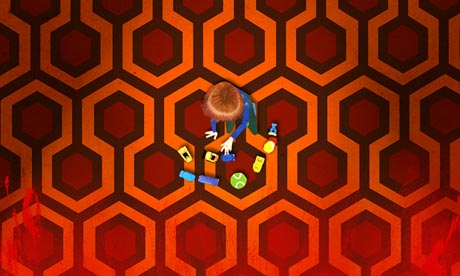As a critic, it’s important to know your biases even if you needn’t acknowledge them in each and every review. Such disclaimers would quickly grow tedious. For Room 237, however, it’s only fair for me to lay them out ahead of time.
Stanley Kubrick is one of my favorite directors and The Shining is likely my favorite of his films. I find conspiracy theories (and conspiracy theorists) to be fascinating and have written a fair amount on 9/11 Truthers. I consider it a personal triumph to have been denounced by King Truther David Ray Griffin in one of his many screeds. I even purchased a limited edition print of Room 237 for display in my office before the film was released.
So you could say that I was predisposed to enjoy director Rodney Ascher’s documentary about the various conspiracy theories and deep readings The Shining has inspired. And you would be right! I enjoyed the film a great deal—though for slightly surprising reasons.
Ascher’s documentary interweaves interviews with five Shining-obsessed superfans. The film, you may recall, follows the slow descent into madness of Jack Torrance (Jack Nicholson) during one snowy winter while he serves as the winter caretaker of the snowed-in Overlook Hotel.
They’re the sort of folks who create elaborate floor plans trying to determine the layout of the Overlook. They’re the sort of folks who run the film backwards and forwards at the same time with the images superimposed on each other to find "synchronicities." They’re the sort of folks who believe that The Shining is actually a secret confession by Stanley Kubrick that he faked the Apollo moon landing for the government.
These are my kind of folks.
As Room 237 demonstrates, they may be a bit on the compulsive side, but they are just regular people who have latched on to a cultural artifact in order to give their life a sense of order, a smidge of purpose.
Early on, you can hear the son of one of the speakers yelling in the background; he asks Ascher if it’s audible and spends a few seconds quieting the child. Later, the man discusses his own connections to the film: "It gets weird. As I’ve been obsessing over this thing I’ve been at home. I’ve been out of work for a while. Like, uh … I have a small son. We’re thinking of moving somewhere isolated. I mean, things get strange. Like wow, my life has actually become The Shining."
Previously, the same man had discussed screening the film simultaneously forwards and backwards, imposing the images on top of each other. He went on and on about all the ways in which images lined up: faces overlapping faces; credits overlapping cars; images juxtaposed to create meaning; and so on and so forth. The simple explanation—namely, that basic rules of cinematic composition, such as putting the focus of the action in the middle of the screen, mean that such coincidences are likely to come up with every competently filmed movie ever made—goes unacknowledged.
What you see here is what you see from most conspiracy theorists: an attempt to impose order on randomness. Like those obsessed with Dark Side of Oz—the theory that Pink Floyd’s Dark Side of the Moon is secretly a soundtrack for The Wizard of Oz—our Shining fans are trying to make the world cohere and use coincidences, real and imagined, to make it so.
You see similar efforts when our speakers try to excuse random continuity errors—chairs that go missing from shot to shot, that sort of thing—as deliberate ploys by Kubrick to add deeper meaning to the proceedings. I can see some of those prone to conspiracism looking at these sequences and sagely nodding their head. I can also see Stanley Kubrick, a noted obsessive in his own right, watching Room 237 and muttering under his breath "Shit. I thought I caught all those screwups."
What you find time and again are Ascher’s interview subjects finding themselves in Kubrick’s work: consider the professor of history who focuses on the Holocaust reading the film as a comment on the Nazi’s killing of the Jews, or the man who lived near Lake Calumet deciding that the inclusion of Calumet baking powder in two key shots means that it’s a film about the slaughter of the Indians.
Room 237 isn’t about The Shining or the Holocaust or the slaughter of Native Americans or the Apollo moon landing. It’s about people finding order in chaos. It's about all conspiracy theories and all conspiracy theorists, not just those who happen to have latched on to The Shining. It’s also a brilliant piece of filmmaking and one of the best documentaries in recent memory.
